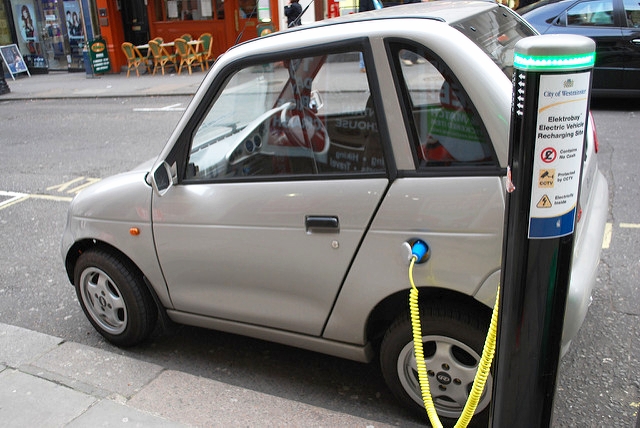Two Detroit-based automakers are strengthening their commitment to producing electric vehicles. On Monday, October 2, 2017, General Motors and Ford both announced their plans to drastically increase their production of electric vehicles in the coming years. According to the Detroit Free Press, GM is planning on releasing two new electric vehicles in the next 17 months, and Ford plans on adding 13 electric vehicles to their lineup over the next 5 years.
Mark Reuss, the Chief of Product Development at GM’s Warren Tech Center, GM believes that, “the future is electric.” One such electric GM vehicle will be a mid-sized luxury SUV, and another will be a large, sleek, crossover with three rows of seating and is rumored to be a “futuristic” version of one GMs current electric models, the Chevy Bolt. The two vehicles GM is releasing in the near future are part of a larger plan to have 20 electric vehicles on the road by 2023, and is looking to “begin production of hydrogen fuel cells at its Brownstown battery plant in Michigan by 2020.” The automaker says that some of these vehicles will be battery operated and others will be fuel cell operated (meaning they use hydrogen and oxygen to produce electricity). The good new for the environment about fuel cell technology is that the only emission of a fuel cell vehicle is water.
GM's announcement for an electric SUV comes at a great time as the market for SUVs is growing quickly (even millennials are interested in larger vehicles), and GM is looking to capitalize on that.
Meanwhile Ford has created “Team Edison," a team within the company that is dedicated exclusively to the development of electric vehicles. Ford will be investing $4.5 billion over the next 5 years to develop 13 new battery electric vehicles. These are likely to include hybrid versions of the F-150 pickup truck, Mustang, police responder vehicle, and maybe even an autonomous vehicle. The company is also developing a battery operated small electric SUV. Sherif Marakby, Ford’s Vice President of Autonomous Vehicles and Electrification said that, “by 2020, Ford plans to produce an electric car that can go 300 miles before needing to recharge.”
Despite the push from large automakers, and the fact that electric car sales reached a record high in 2016, as previously mentioned by The Michigan Law Firm, PLLC blog, electric vehicles are still fairly uncommon sights on the road. According to Bloomberg, there were 2 million electric vehicles on the road in 2016. While this is a whopping 60% increase from 2015, electric vehicles still only account for just .2% of total lightweight duty vehicles. The New York Times reported that in the first 8 months of 2017, “Americans purchased only about 60,000 battery-powered electric vehicles, and about the same number of plug-in hybrid models...accounting for only 1% of the market.”
If anything, it will be government regulations, not consumer interest, that drive the demand for electric vehicles. China, the United States, and countries in Europe are moving towards tighter emission regulations that could eventually lead to getting rid of gas powered vehicles all together. China, home to strict pollution regulations, is also home to the greatest number of electric vehicles on the road. Bloomberg reported that the US, Germany, China, France, and the UK, among others are part of the Electric Vehicle Initiative, which aims to have “30 percent market share for battery power cars, buses, trucks and vans by 2030.”
One company that is almost synonymous with electric vehicles is Tesla. While they have shown that there is a demand for electric vehicles, they have also shown how they can be difficult to produce. Tesla’s Model 3 sedan had hundreds of thousands of people paying $1,000 deposits just to be put on a waiting list for the vehicle. But the company recently announced that in the third quarter of this year, they were only able to produce 260 vehicles due to production issues. When it comes to fuel cell vehicles, they are difficult to produce as hydrogen is expensive and not widely available.
Detroit automakers showing such a strong commitment to electric vehicles is encouraging. It’s exciting to know that in a few years there will be many “clean” cars on the road, cutting down on emissions and pollution. Hopefully other automakers will join GM and Ford and make electric vehicles a priority as well, and research and development will make these vehicles easier and cheaper to produce, making them more easily available. Electric vehicles are good for everyone - they will save drivers money on gas, and they help the planet reduce its carbon footprint.
Electric vehicles are good for the environment, but car accidents happen regardless of how fuel efficient a vehicle is. If you have been involved in an automobile accident involving an electric car, call The Michigan Law Firm, PLLC at 844.4MI.FIRM for a free consultation with an experienced car accident attorney today.









